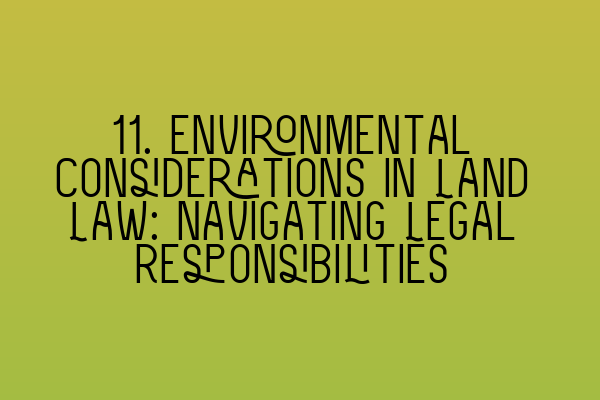Environmental Considerations in Land Law: Navigating Legal Responsibilities
At SQE Property Law & Land Law, we understand the importance of considering environmental factors when it comes to land law. With increasing awareness of environmental issues and the impact of human activities on the planet, it is crucial for solicitors and property owners to navigate the legal responsibilities associated with environmental considerations. In this blog post, we will explore the key aspects of environmental considerations in land law and provide guidance on how to address these responsibilities.
1. Understanding Environmental Impact Assessments
One of the primary tools to assess the environmental implications of a proposed development is an Environmental Impact Assessment (EIA). An EIA helps to identify and evaluate the potential effects of a project on the environment, including issues such as air and water pollution, noise pollution, and habitat destruction. Solicitors involved in land law should be familiar with the legal requirements surrounding EIAs and advise their clients accordingly.
2. Compliance with Environmental Regulations
As an integral part of land law, compliance with environmental regulations is essential. There are various regulations and legislation in place to protect the environment and ensure responsible land management. These include the Environmental Protection Act 1990, Wildlife and Countryside Act 1981, and the Water Resources Act 1991, among others. It is crucial for solicitors to stay up to date with these regulations to guide their clients in complying with the law.
3. Remediation of Contaminated Land
Contaminated land can pose risks to human health and the environment. Solicitors dealing with land transactions should consider the potential for contaminated land and advise their clients accordingly. Remediating contaminated land may involve soil testing, cleanup measures, and compliance with regulatory requirements. It is important to engage with environmental consultants and specialists to assess and address any contamination issues.
4. Conservation and Protected Areas
Conservation areas and protected sites, such as Sites of Special Scientific Interest (SSSI) and Areas of Outstanding Natural Beauty (AONB), require special consideration in land law. Development within these areas is subject to strict regulations to preserve their ecological and aesthetic value. Solicitors should ensure their clients are aware of any restrictions and obtain the necessary permissions and consents for development activities within such areas.
5. Sustainable Development and Green Initiatives
In recent years, the focus on sustainable development and green initiatives has intensified. Solicitors should be well-versed in advising clients on incorporating sustainable practices into land development projects. This could include energy-efficient building designs, renewable energy installations, and eco-friendly landscaping. Compliance with green building standards, such as BREEAM or LEED, can enhance the value of a property while reducing its environmental impact.
6. Climate Change Considerations
With climate change becoming a significant global concern, solicitors must consider its implications in land law. Rising sea levels, increased flooding risks, and extreme weather events can have a profound impact on land use and development. It is crucial to evaluate and address these risks in land transactions and advise clients on climate change mitigation measures, such as flood defense systems or sustainable drainage solutions.
7. Public Access to Land and Rights of Way
Public access to land and rights of way are important considerations in land law. Solicitors should guide their clients on public rights of way and access to privately-owned land, ensuring compliance with the law. Understanding the legal framework surrounding public access, including the Countryside and Rights of Way Act 2000, is crucial for responsible land management.
8. Environmental Due Diligence
When acquiring or disposing of land, conducting environmental due diligence is essential. Solicitors should guide their clients in assessing the environmental risks associated with a property, such as past contamination, potential liabilities, or environmental restrictions. This may involve reviewing historical land use, site investigations, and obtaining environmental reports.
9. Collaboration with Environmental Professionals
To effectively address environmental considerations in land law, collaboration with environmental professionals is essential. Solicitors should work closely with environmental consultants, ecologists, and other specialists to assess and mitigate environmental risks. By leveraging their expertise, solicitors can ensure their clients make informed decisions and fulfill their legal responsibilities.
10. Continuous Professional Development
Given the dynamic nature of environmental legislation and best practices, solicitors must engage in continuous professional development. Staying updated with the latest developments in environmental law and regulations will enable solicitors to provide accurate and relevant advice to their clients. SQE Property Law & Land Law offers comprehensive SQE 1 and SQE 2 preparation courses to ensure solicitors are well-equipped to navigate the complexities of environmental considerations in land law.
In conclusion, environmental considerations play a vital role in land law. Solicitors must understand and navigate the legal responsibilities associated with environmental impacts, compliance with regulations, and sustainable land development. By staying informed, collaborating with environmental professionals, and engaging in continuous professional development, solicitors can effectively address environmental concerns and guide their clients towards responsible and sustainable land management.
Related Articles:
– SQE 1 Practice Exam Questions
– SQE 1 Practice Mocks FLK1 FLK2
– SQE 2 Preparation Courses
– SQE 1 Preparation Courses
– SRA SQE Exam Dates
